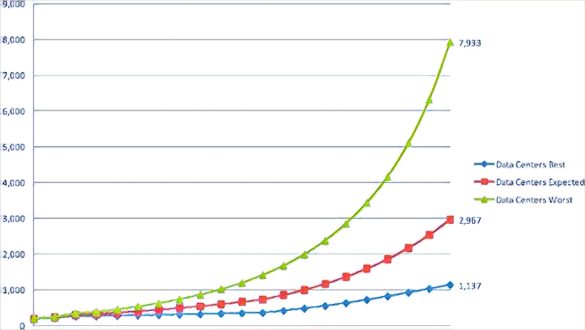Nigeria’s data centers, the backbone of its digital economy, are facing a dilemma: raising their prices or absorbing the soaring energy costs. The high cost of petrol and diesel, which power most data centers without reliable grid electricity, has strained their operations and profitability. This could have a ripple effect on the cost and quality of the country’s internet and other IT services, which rely heavily on data centers for data storage, processing, and transmission.
Data centers are essentially large facilities that house thousands of servers and computers that store and process huge amounts of data. They require a lot of energy to run and to keep cool, as overheating can damage the equipment and cause data loss. According to a report by Institutional Real Estate, the average full-scale data center is 100,000 square feet and runs around 100,000 servers, consuming up to 7,446 kWh of electricity per year per server.
In Nigeria, where grid electricity is erratic and insufficient, data centers rely on diesel generators as their primary or backup power source. However, diesel prices have skyrocketed in recent months due to the depreciation of the naira, the rising global oil prices, and the removal of subsidies on petrol. According to experts, diesel-powered electricity now costs over N300/kWh while petrol-powered electricity costs about N200/kWh.
The Association of Licenced Telecommunication Operators of Nigeria (ALTON), which represents data center operators among other industry players, has raised the alarm over the impact of this increase on their members’ businesses. In a meeting with Bosun Tijani, the minister of communications, innovation, and digital economy, ALTON president Gbenga Adebayo said that the 300 percent increase in diesel cost was affecting their members’ ability to run their businesses efficiently and profitably.
He cited other industry challenges, such as huge debts, lack of access to foreign exchange, insecurity, and vandalism. He urged the government and the industry to work together to ensure the safety and benefits of data center operations.
Nigeria has 11 data centers, 10 in Lagos and one in Abuja. They support various sectors of the economy, such as banking, e-commerce, education, health, and entertainment. They also contribute to the country’s broadband penetration, which declined to an eleven-month low of 45.7 percent in August 2021. The country has set a target of achieving 50 percent broadband coverage by the end of 2023.
However, this target may be jeopardized if data centers are forced to increase prices or reduce their services due to high energy costs. This could affect the affordability and accessibility of the Internet and other IT services for millions of Nigerians who depend on them for information, communication, and empowerment.
Some data center operators have adopted measures to mitigate the impact of rising energy costs, such as improving their energy efficiency, leveraging global supply chains, and adjusting their pricing structures. They have also advocated for outsourcing critical IT infrastructure to third-party data centers to reduce operational costs and risks.
However, these measures may not be enough to sustain the growth and competitiveness of the data center industry in Nigeria. Experts have called for more investments in alternative and renewable sources of energy, such as gas, solar, and wind, which are cheaper and cleaner than diesel and petrol. They have also urged the government to provide incentives and support, such as tax breaks, subsidies, and security guarantees, for data center operators.
The data center industry is vital for Nigeria’s digital transformation and economic development. It has the potential to create jobs, generate revenue, and drive innovation. However, it needs an adequate and affordable energy supply to thrive and survive. If this challenge is not addressed urgently, Nigeria may lose its edge in the global digital economy.
Source: BusinessDay


